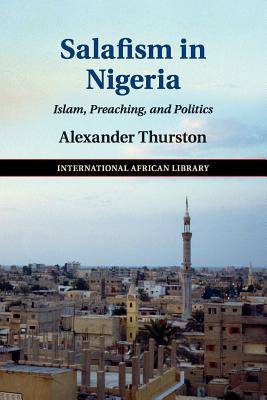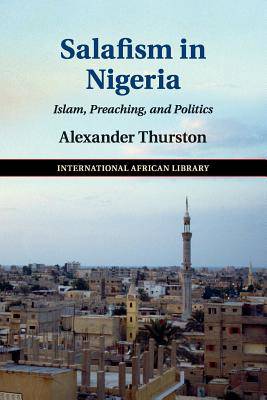
Door een staking bij bpost kan je online bestelling op dit moment iets langer onderweg zijn dan voorzien. Dringend iets nodig? Onze winkels ontvangen jou met open armen!
- Afhalen na 1 uur in een winkel met voorraad
- Gratis thuislevering in België vanaf € 30
- Ruim aanbod met 7 miljoen producten
Door een staking bij bpost kan je online bestelling op dit moment iets langer onderweg zijn dan voorzien. Dringend iets nodig? Onze winkels ontvangen jou met open armen!
- Afhalen na 1 uur in een winkel met voorraad
- Gratis thuislevering in België vanaf € 30
- Ruim aanbod met 7 miljoen producten
Zoeken
€ 60,95
+ 121 punten
Uitvoering
Omschrijving
The spectre of Boko Haram and its activities in Nigeria dominates both media and academic analysis of Islam in the region. But, as Alexander Thurston argues here, beyond the sensational headlines this group generates, the dynamics of Muslim life in northern Nigeria remain poorly understood. Drawing on interviews with leading Salafis in Nigeria as well as on a rereading of the history of the global Salafi movement, this volume explores how a canon of classical and contemporary texts defines Salafism. Examining how these texts are interpreted and - crucially - who it is that has the authority to do so, Thurston offers a systematic analysis of curricula taught in Saudi Arabia and how they shape religious scholars' approach to religion and education once they return to Africa. Essential for scholars of religion and politics, this unique text explores how the canon of Salafism has been used and refined, from Nigeria's return to democracy to the jihadist movement Boko Haram.
Specificaties
Betrokkenen
- Auteur(s):
- Uitgeverij:
Inhoud
- Aantal bladzijden:
- 298
- Taal:
- Engels
- Reeks:
- Reeksnummer:
- nr. 52
Eigenschappen
- Productcode (EAN):
- 9781316610190
- Verschijningsdatum:
- 11/07/2018
- Uitvoering:
- Paperback
- Formaat:
- Trade paperback (VS)
- Afmetingen:
- 152 mm x 229 mm
- Gewicht:
- 403 g

Alleen bij Standaard Boekhandel
+ 121 punten op je klantenkaart van Standaard Boekhandel
Beoordelingen
We publiceren alleen reviews die voldoen aan de voorwaarden voor reviews. Bekijk onze voorwaarden voor reviews.











